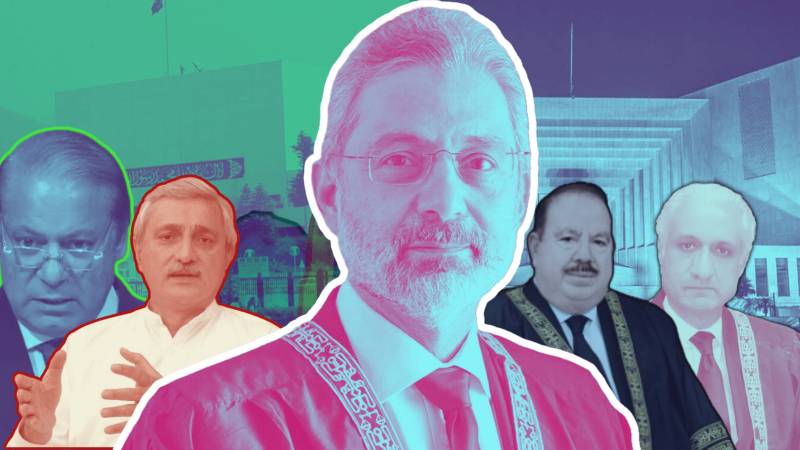
The Supreme Court on Monday ruled that politicians cannot be disqualified for life under Article 62(1)(F).
This was decided by a seven-member bench of the Supreme Court (SC) led by Chief Justice of Pakistan Qazi Faez Isa. The verdict was passed with six judges in favour and one judge, Justice Yahya Afridi, dissenting.
The verdict will immediately benefit deposed prime minister Nawaz Sharif, who will contest next month's elections and possibly stand a chance to be elected as the country's prime minister for a record fourth time. It will also benefit Istehkam-e-Pakistan Party (IPP) Chairman Jahangir Tareen in contesting the upcoming polls.
The Supreme Court had reserved its judgement in the case at the last hearing on January 5. On Monday afternoon, the court reconvened and read out its judgement.
The court overruled the judgement of the court in Samiullah Baloch's case.
The verdict further noted that Article 62(1)(F) cannot be read in isolation from the Constitution.
The court further ruled that contesting elections is a fundamental right of a citizen.
Justice Yahya Afridi, who dissented with the majority verdict, observed that he believed the court's verdict in Baloch's case to be correct.
Earlier, during the hearing of the case, Chief Justice Isa had remarked on how the wisdom of five men could prevail over the wisdom of 342 members of Parliament. Parliament's decision should not be looked down upon. Where does it say in the Constitution that the penalty of disqualification shall be for life; it should not be that when you are in the mood, disqualification is for life, and when you are not in the mood, you end disqualification.
After the verdict, the Attorney General of Pakistan spoke to the media and said that all declarations under Article 184(3) and 199 are in nullity now because neither the Supreme Court under Article 184(3) nor the High Courts under Article 199 are competent courts to give such a declaration while the law has not specified which courts would have the jurisdiction to hear such cases.
Asked what does the verdict mean for election tribunals, the Attorney General said that the tribunals can only allow the candidates to continue and let the people decide.
If nomination papers are challenged on the basis of Article 62(1)(F), they will be allowed until an incoming parliament can draft the relevant law.
On a question about the five-year limit on disqualification set by the Parliament following an amendment to the Elections Act 2017, the attorney general said that the court had left that subject untouched since it had not been challenged.
However, he added that the court has upheld that there is a need for a complete law which specifies the procedure and the jurisdiction of the relevant court, and then the court will review whether the five-year disqualification is reasonable or not.
Asked whether the amended rule, which limited disqualification to five years, the attorney general believed that the specific law would not apply as all declarations relating to Article 62(1)(F) have become a nullity.

